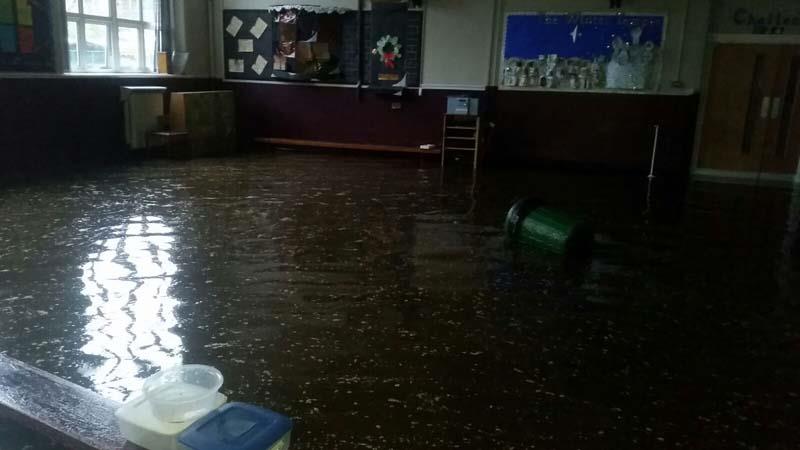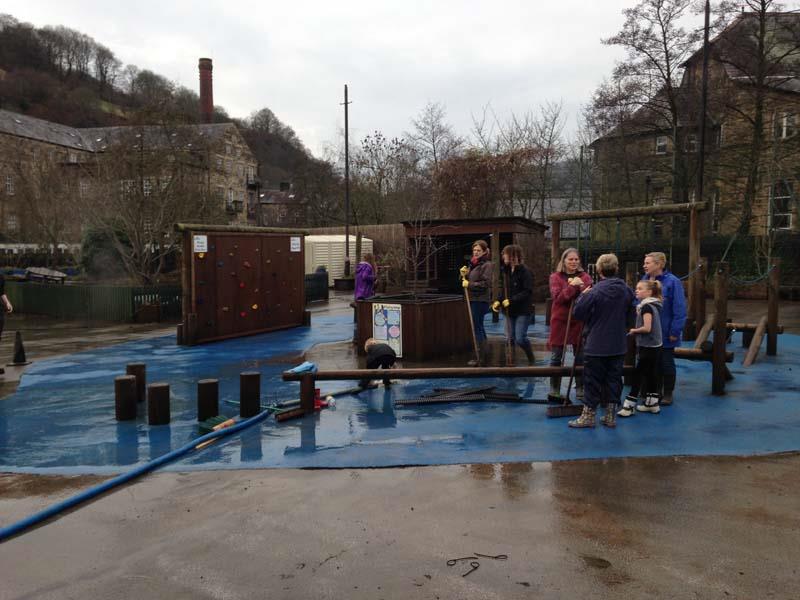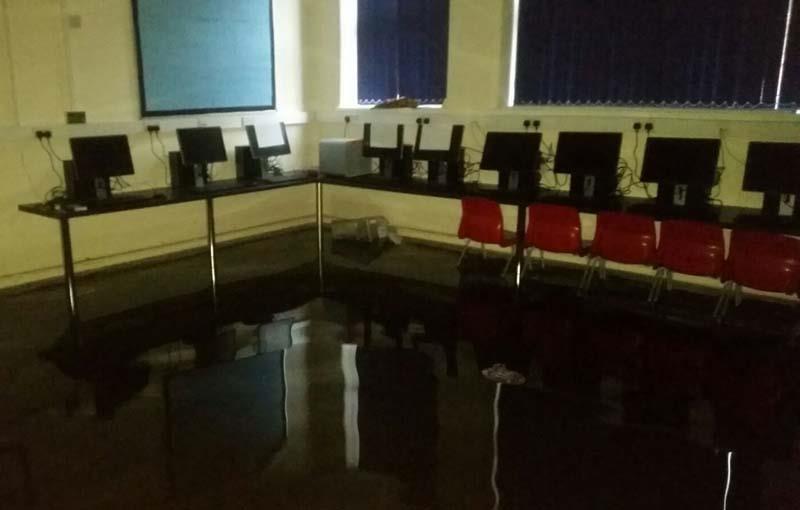
Riverside Junior School in Hebden Bridge is an average sized school built in Victorian times. As an old school building, it has always had its issues and continuous problems with the roof were frequently under discussion. What to do with a leaking roof, however, paled into insignificance when head of school, Rachel Burton, arrived in the school playground the day after Boxing Day.
“I was away for Christmas staying in Manchester when I had a phone call from my site manager on Boxing Day to say that he couldn’t pump the water out quick enough,” explained Rachel. Contact with her daughters who were still at the family home had alerted Rachel to the problems that Hebden Bridge was facing but nothing could have prepared her for what she saw on her return.
In fact there was nothing that the site supervisor could have done. The flooding was horrendous and the canal and river had merged into one and had breached the sewage plant too.
“The flood water carried 80 per cent sewage with it,” explained Rachel. “The water around the school was waist deep. I’d been a police officer before coming into teaching so had seen the affects of flooding first hand. I knew how bad it could be.”
Stood in front of her school, Rachel was shocked at the devastation: “All the parquet flooring had been destroyed and that really got to me. It can’t be replaced and was a real feature of our school.”
What Rachel wasn’t prepared for either were the number of volunteers who were waiting for her that day ready to help in whatever way they could. “There were literally hundreds of people there to help,” she recalled.
Once the site was cleared it was down to Rachel and her helpers to see what could be salvaged. There was no hope for some of the furniture or the boiler. The school is built on two floors with a cellar and the boiler was in the cellar where the flood had first hit.

The kitchen and offices were on the ground floor along with some classrooms. The kitchen was totally destroyed and this was to cause difficulties not only for Riverside itself but five other neighbouring schools that they prepared meals for. Fortunately a local pub let the school use their facilities and the kitchen staff have been able to prepare packed lunches there.
With the help of the volunteers, Rachel was able to save the tables in the year 3 ground floor classrooms. What they weren’t able to save were the office computers and the landline was also out of order: “We had to go out and buy mobiles so that we were contactable,” said Rachel. “Fortunately the server was higher up on a plinth and that was okay.”
Riverside had also recently acquired some brand new computers but luckily the water was just a few inches off them and they were able to get them out of danger and relatively dry: “Both my year 3 and year 4 teachers had taken books home and these were safe. It was a pity though that the topic books that we were so proud of had all been washed away.”
Taking stock of the school was a soul-destroying job. Not only was downstairs and the cellar full of sewage and water but upstairs was wet and waterlogged too. Although the roof is sound, water has been coming through the eaves as a result of problems with the guttering and the false roof had fallen in, affecting a number of classrooms.

Rachel, staff and volunteers spent the following week just clearing and cleaning the building. It took three days to pump the water out of the cellar and although the water level did go down quickly the level in the river and canal remained high, leaving some anxiety about the risk of further flooding.
This was a situation that Rachel had never encountered before. However, the acting executive headteacher of Central Street Infant School, Jenny Melling, had. Her school had been more at risk of flooding and had even identified Riverside as an emergency gathering point should Central Street flood. Ms Melling provided advice and Rachel found her support invaluable.
“The support of the community has been absolutely amazing,” added Rachel. “Hebden Bridge has really rallied round. The Asian community helped to lift all the old quarry tiles. I don’t know how they managed it without any tools. Local people brought in food to keep everyone’s spirits up.”
Rachel was keen to ensure that the school opened again as soon as possible after the Christmas holiday. A priority was establishing a teaching area for year 6 and Rachel and another of her teachers agreed to team-teach in the gym upstairs. “We put a carpet down in there but it still wasn’t ideal because we only had one girls’ and one boys’ toilet in operation. It’s been so cold in the school that even after everyone wraps up in their coats, gloves and scarves they still can’t get warm.”
Part of the playground and garden area are no longer accessible as space was needed for the builders. This had to be organised quickly and a major issue for Rachel was ensuring that safeguarding arrangements were in place.
Even when Rachel and her team felt that they had identified all the problems, further difficulties arose: “We noticed that the flood water had cracked the playground wall,” said Rachel. “Just when you think that there is nothing else to go wrong, something does.”

Rachel had to delay the opening of the school after Christmas: “Everything was still so cold and damp and there were so many problems with decontamination,” she explained.
Even when the children did start back, the opening times had to be staggered because of the difficulties of getting the children in the school without bringing in more mud and dirty water from the streets outside: “Finally it did get better, as the areas they were walking through were decontaminated too.”
One of Rachel’s main problems now is the cold. With the boilers out of order and fan heaters tripping the system each time they’re switched on it has been difficult to bring the temperature in the school up to a reasonable level.
She added: “At least we will have new boilers but the problem will be whether they are compatible with the old system or not.”
Although the insurance covered the damage to the cellar and ground floor, the water damage on the first floor was disputed and consequently Rachel knew that they were at risk of struggling to replace some of their resources.
However, the community’s efforts to raise money for the school have staggered Rachel.
“Parents have already raised £5,000 with the community raising a further £4,000,” she said. “Phil Earl, the author, lives in Hebden Bridge and he has been raising money too. Whoever bids the most at our Just Giving auction will feature in his next book. We have many artistic people living locally such as scriptwriters and artists. They’ve all come together to help raise money for us and now we’re aiming towards £25,000.”
While the children could be temporarily housed upstairs, Rachel and her team were now focused on ensuring that they make the most of the opportunity to look afresh at their school. The downstairs is being completely refitted and Rachel is keen to make the most of the opportunity to make changes where necessary and wants to ensure that the first floor looks as good as the ground. This is where the fundraising will come in particularly handy: “We’ve had an architect in to help us redesign and we’re thinking about our big plans for the future.”
Rachel has been very pragmatic about the whole incident: “You just have to get on with it,” she said. “Be persistent too. I’ve had to knock on doors and continue knocking on them. A good piece of advice I was given is that quiet girls don’t get noticed. I would suggest that anyone finding themselves in a similar situation should take advice. Ask others who already have experience of this kind of problem.”
For Rachel it was crucial that as little time as possible was lost in enabling the school to get back to normal: “A few years ago the school was in special measures and then spent a couple of years in requiring improvement. At our last inspection we were judged to be good and numbers have risen. We didn’t want to lose this momentum.”
The children and staff have been amazing and Rachel emphasises how much they have taken things in their stride: “When the children did come back to school you wouldn’t have thought that anything had happened,” she said.
Rachel has certainly shown tenacity and determination: “If you want something done, fight for it. It’s certainly brought the community here together and demonstrates what we can do.”
- Suzanne O’Connell is a freelance education writer and former primary school headteacher.
